- Home
- Alan Scholefield
Venom Page 2
Venom Read online
Page 2
Again there was the flick of a curtain at the corridor window and he watched with half-closed eyes. His mother’s face was framed by one of the glass panels. The curtain fell back into place and the face vanished.
* * *
Ruth Blanchet stood by the curtained passage window of her son’s room for a few moments and then made her way back to her own room on the half-landing above. He hadn’t been asleep, she was sure of that, but at least he was resting. Rest was everything, Dr Tremlett had said: rest, warmth, a balanced diet, “and don’t let him have too much time to think of himself, give him an interest. Part of his trouble is psychological.” She had done it, she told herself; everything that had been asked of her. Rest: there was a rest period after lunch at his private school and she had been insistent to the headmaster that he should, in fact, rest, and not use it, as such periods were so often used by schoolboys, for horseplay and games and, though she did not say so, unpleasant sexual experiments. Warmth: she couldn’t do more than she had done. Michel had raised his eyebrows when he had seen the bills for the new air- ducted heating with the automatic humidifier. She had not mentioned that it had been specifically installed for Philip’s benefit. Instead she had said, “Michel, you come from Provence, I was born in Florida; the British think their climate’s semi-tropical, we know it isn’t.”
He had not been amused. He was a small man, slightly shorter than Ruth. She had always thought that the southern French were extrovert Latins, but Michel was quiet, withdrawn, cold. When she had made the joke about the British climate, he had pursed his lips and tapped the bill on the top of the table and finally nodded and said, “If it must be.”
A balanced diet. She could certainly claim that, for who did the cooking if not she? One of the first things Michel had asked when they were married was whether she wished him to send over a cook from France with the maid, but she had rejected the idea. Cooking had been part of her hotel training and, apart from that, she enjoyed it–especially as she had someone to clean up after her. It seemed to be working out. She was able to keep Philip on the sort of diet Dr Tremlett had outlined and she was also able to cope with more elaborate meals on the rare occasions when Michel was at home and not flying halfway around the world to make an unexpected (and therefore unwelcome) lightning inspection of one of his hotels.
As for an interest, there was Philip’s menagerie, the Great Whatever-it-was Crater Menagerie. She had Dick to thank for that. He had made the boy interested in keeping animals. Give him his due, he had done that.
She went into her room, sat down at her writing desk and looked at her watch: 2.53. She had nearly twenty-five minutes before Dave would come round with the car and only the notes left to write. She nodded with satisfaction: her timing was right. Her dark hide suitcases, neat, shining, stood by the door of her bedroom, her coat lay across a Victorian spoon-back chair in the corner, and by its side was her make-up case. Everything in its place. As her eyes came back from the suitcases she saw herself in the long, gilt mirror on the wall. She was wearing a black and brown mohair tweed suit with a fawn silk blouse, and wondered whether she should have worn something slightly less sombre. But Michel did not comment much on her clothes. He expected her to buy the best and she did so. Once, when she was wearing a murderously expensive Chanel suit he had said, somewhat shyly, “You look very neat, cherie.” It was a strange word to use but she had known what he meant and was oddly gratified, as though he had called her ravishing. She saw a woman in her mid-thirties, dark, with a pale face, broad Slavic cheekbones, strong competent hands and eyes so dark brown they were almost black; they were like her son’s, slightly larger than normal, with shadow-smudges beneath them; in them she could read uncertainty, doubt, anxiety. Well, she thought, why the hell shouldn’t I be anxious? I’ve got a son who sickens with every goddam germ known to man and now I’m flying off and leaving him. She reached for her paper with the words, “from Ruth Blanchet” at the top and wrote “Louise”, underlining it with a fine stroke of the pen. Louise was to do the cooking for the two-and-a-bit days she would be away and she wanted to be certain she got it right: no heavy French sauces, no cassoulets, no spicy Provençal dishes. She wrote:
“1. Dinner. Consommé (there is chicken stock in the fridge). Followed by . . .” She had been about to write down an omelette but then she remembered that Dick Howard would be having all his meals with Philip so she wrote down lamb chops instead, with mashed potatoes and a green salad followed by yoghurt for Philip; (she had a childlike faith in yoghurt because she had once read that people who ate a lot of it lived to astonishing ages) and a creme caramel for Dick. She had left several cremes caramel in the fridge and half-a-dozen yoghurts and there was fresh fruit for Louise and Dave if they wanted it.
2. Breakfast. Philip liked cereal, she would have been happier if he had eaten porridge. They compromised on muesli. She wrote that down. Dick could order what he liked. She wondered if he usually ate breakfast. Sometimes he looked . . . she had seen enough hotel guests with the morning trembles to recognize what they had been on the night before. And once again her heart began to flutter in her chest like a small trapped bird. She told herself not to be stupid, but the panic got worse. What if something happened? What if Dick got drunk? How could she leave Philip in his care?
But what if she didn’t? The cable telling her that Michel would be in Vienna from Friday night to Monday morning before he flew off to the United States had been a simple statement of fact. There was no request that she join him, just the facts. Too often in the past she had answered the telephone call or the cable with excuses. Some had been real; there had been builders or gasmen or electricians in and out of the house all day, but gradually she had found herself making up excuses not to leave Philip. Michel’s messages had grown fewer. In the past six months she had received none. Then, two days before, had come the cable from his secretary telling her where he would be that weekend. She had sat down and worked out that he had spent a total of twelve days at their home in London during those six months. She knew there was no alternative: if she kept refusing they would become strangers. She looked round the room, seeing the richness of its furnishings with a new eye. She had to go. And of course Philip would be all right. It wasn’t as if Dick was alone, she told herself, there was Louise and Dave in case anything went wrong.
3. Lunch. Veal. Louise could do the escalopes in a little butter: no cream, no marsala, simply naturel. She underlined the word. Louise had not objected when they had first discussed it; but she had seemed uninterested. Her eyes had slid away and she had listened as though it was none of her business. There was something odd about Louise. Ruth could not put her finger on it but she felt as though Louise was constantly sizing her up: not only herself, but the house, the furniture, her clothes, her jewellery. Once she had found her jewellery case disturbed, but when she checked nothing was missing and she guessed Louise had tried on one or two items. She decided to say nothing and it had not happened again. Louise was like a dealer or a tax inspector: that sofa must be worth X pounds and that painting Y and the silver Z; it was that sort of feeling, but underneath Ruth caught a faint hint of something more. Envy? Well, that was not hard to understand. Ruth herself would have been envious in Louise’s place. But she did not have to stay if she didn’t want to. There were English servants to be found, though God knows what Michel would say. “The English are not a service people,” he had said when he first mentioned giving her a French maid. “They do not like to serve. When have you seen a good English waiter?” And she had to acknowledge that he knew what he was talking about. Even Dave, the chauffeur, with his long blond hair and his dandruff, had a knowing manner. He called her Madame and when Michel was there he was perfectly respectful, but when she was alone there was an undertone to his “Good morning, Madame”. It was as though it were a tiny joke between them that she, an American and no better than he, should be addressed in this exaggerated fashion.
4. Dinner (Saturday) . . . She wrote quickl
y and neatly and soon she had finished the menus and had written another note about laundry and about the thermostat on the central heating: “It is not to go below 22 degrees C,” she wrote, and underlined that too.
She clipped the notes together with a small hand stapler, then pulled another sheet towards her and wrote “Dick”. She had been tempted to write “Richard”, but Dick sounded more friendly and at that moment she wanted his friendship.
Sometimes she resented the way she had been manoeuvred into first-name terms.
From the day he had moved into the flat on the ground floor, he had treated her with an avuncular–sometimes, she thought an almost paternal–air. She had known that the flat was being prepared for a . . . she had supposed a sort of glorified concierge, a companion, someone who would be in the house, even if hardly seen, to keep her company when Michel was away. In her mind’s eye she had visualized a woman, a comfortable body, Scottish perhaps. Then one day Michel had telephoned her from his London office in St James’s Square and told her that someone was coming that day to occupy the flat–and Richard Howard had arrived. The first thing she noticed about him was his grey eyes, eyes that should have been steady but were instead filled with a kind of bewilderment. Then she saw the gun-cases. Six of them. Four rifles and two shotguns that now hung on the wall in his sitting-room, and she knew that Michel had more than a concierge in mind, Richard Howard was a guardian.
But he had been so weak and frail then that he seemed hardly able to look after himself. He had made no effort to pick up any of his belongings, leaving everything to the taxi driver.
“Sorry about the junk,” he had said. “Always thought a man should be able to put all he possessed into one suitcase. Travel light. But I can’t manage without three. And the guns, of course.” Then he had followed her into the house and she had noticed that he limped, or not so much limped as shuffled. His pallor was unhealthy, the shade skin goes when deep suntan has been kept inside for a few weeks.
She had wanted to ask Michel about him but he had flown away about his business and she was left in the house with a strange man. He had started to call her Ruth at the end of the first week.
“You’re too pretty to be called Mrs all the time,” he had said with heavy-handed gallantry. “You call me Dick and I’ll call you Ruth. Agreed?” How could she not agree?
When her husband came back three weeks later another factor had entered the relationship. “How do you get on with Howard?” Blanchet had asked, removing with precision the fine dorsal bones of a Dover sole.
There were several things she might have said: that Howard was a drinking man, that Howard had seemed too frail to have watched over a sparrow (though he was stronger now), that she didn’t like the idea of a man living in the downstairs flat . . . But she said none of these for the one outstanding success had been Philip. From the moment Howard had joined the family, for that is what it amounted to, Philip had undergone a change. Until then he had been withdrawn, introverted, sullen if challenged, moody and often bad-tempered. Within a fortnight of Dick Howard’s arrival he had blossomed. She had watched the two of them at first with suspicion and then with a measure of relief. She had often told herself that Philip did not need a father; that she was capable of giving him that sort of masculine discipline, but when she saw how he acted with Howard she knew this had been a rationalization born of the knowledge that Michel was never going to be a father to him. And so when her husband had asked her how she got on with Howard she thought of Philip and told him the experiment was a success.
“I’m glad,” he said. Then he said something she would never forget. “They can always get at me through Philippe.” (He always gave the name the French pronunciation.) It was as though a cold wind suddenly chilled her. “Get at you?” she said. “Who? What are you talking about? Who are they? And why Philip?” But the telephone had rung and when he came back from a discussion with one of his directors in Paris he was preoccupied and unwilling to explain.
She pulled the notepaper towards her and began to write.
1. Philip is not to go outside.
2. Please see that the house is kept warm.
3. Louise has instructions about food.
4. We are staying at Sacher’s in Vienna. (She phoned the International Exchange for the number.)
5. Dr Tremlett’s address is 94 Collingwood Square. Telephone number 711-967891.
6. Bedtime is 9 o’clock except tomorrow when he can stay up to watch Starksy and Hutch.
7. He must rest between . . .
. . . she wrote quickly and concisely and in a few minutes the list was done. Then she went downstairs.
* * *
Richard Howard was dreaming. He sat sprawling in the big chintz-covered armchair in his sitting-room, his mouth half open, breathing heavily and jerkily as the horror of the dream caused his heart to race. He always slept for a little while after lunch, specially on jours avec. Today, however, was a jour sans, tomorrow would be a jour avec. Nothing hard today even though it was a Friday. Jours sans were days when he should have had nothing at all. He excepted wine. A little wine never did anyone any harm. “Take a little wine for thy stomach’s sake.” Someone in the Bible. Couldn’t remember who. But if it said so in the Bible, who was going to argue? So he had taken a little wine for his stomach’s sake. He sometimes thought how aptly ironic the aphorism was in his own case, for it was in the abdominal region where the muscles had been ripped and the flesh mangled and the actual lining of the stomach torn open. Later, when he could understand what the doctors and nurses said to him, he had realized how lucky he was to be alive: doctors don’t often use the word “miracle”.
The wine, while comforting the pain, had made him sleepy. He had slept and now he was dreaming. It was the same dream he had had on many occasions. He was lying on his back under an acacia tree and the lion was on top of him. He could smell his breath and see his teeth, stained brown at the roots; feel his weight. He knew the gun was somewhere near his right hand and he stretched for it. But before his fingers could reach the butt the lion had disembowelled him with his churning hind legs and his entrails had sprawled all over the dusty veld.
He jerked awake, heart hammering in his ears, sweat lying cold on his forehead, and rose shakily to his feet, the dream still clear and terrible in his mind. Automatically, he crossed to a low table on which stood several modern Swedish decanters and lifted the one containing brandy, reached for a glass and was about to pour himself a measure when he paused. It was a jour sans. But he needed something, that was damn certain, after a dream like that. Just one. He poured out a drink and swallowed half of it, feeling the heat of it in his throat and then his stomach. That was better. God, if he could only stop dreaming. If he could simply sink into black oblivion. He knew the doctors would have a name for what was going on inside him. Time, they’d said at the hospital. Well, time was putting right the wounds of the body; what about those of the mind? In the novels he’d read it was a matter of baring your secrets, talking about the things you didn’t want to talk about or didn’t even know were there. Once you let them out, talked about them, confessed, opened up your inner self–why, then bingo, everything was all right. That was nonsense. Why had he told Philip if not to exorcise it from his mind? Admittedly he had varied it slightly from what had actually happened, but he didn’t want to frighten the boy and in any case he, Richard Howard, knew what had happened; wasn’t that enough?
Thought of Philip reminded him what day it was and his mind thankfully grasped at a different subject. He wandered over to the window and stood watching the powdery granules of snow smack against the glass then bounce into the area below. It wasn’t the best day for Philip to be going out but you couldn’t choose your time, you had to grasp the opportunity. And the opportunity was today, this afternoon, for tomorrow was Saturday and Saturday was the Jewish Sabbath and Loewenthal’s was closed. It also closed on the Christian Sabbath and Ruth was due back on Monday, which only left this afternoon.
<
br /> The wind pushed and pulled at the branches of the plane trees but the double-glazing kept out all noise. Should he, he wondered, go with Philip? But they had been over this together secretly and it had been agreed that he go by himself. The other times, when they had bought the gerbils and the white mice and the guinea-pigs he had accompanied Philip in the Citroen with Dave driving. This time it was to be by taxi.
Philip by himself; an adventure. It was high time he learned to do things for himself. If only Ruth would let the boy alone, go and join Blanchet whenever she could, then they could really have some fun. He could take him to the Zoo and to Whipsnade and let him see animals in more or less their natural freedom. They could travel by bus and train like ordinary people and not in an overheated limousine with a chauffeur at the wheel. How did she expect Philip to grow up like an ordinary child and into an ordinary–or put a better way, a natural man, when she was bringing him up in a hothouse atmosphere like some rare tropical plant? Asthma. Bronchitis. Rot. He had a weak chest, that was all, and it would never get any better if she went on like this. Not that Howard was against the warmth of the house. Coming as he did from the tropics it was the one thing that made a British winter bearable. There had to be a balance, as there was in nature. What Philip needed was a school like Gordonstoun with its emphasis on hardihood and the outdoors. Memories of his own youth in Africa crowded into his mind: of freezing mornings in the Highlands of Kenya, when the water in the rain barrels was frozen and frost covered the English garden; the huge fireplace of mountain-stone and his father standing almost on top of the fire in the early winter mornings sipping his hot coffee and shouting at old Luke, the major-domo, for shaving water or more coffee, or where the hell was his breakfast, and Luke who seemed, in Howard’s memory, always to have been the same age, about seventy, irritated and irascible and constantly mumbling under his breath at all the trouble he was being put to. And then out on the horse to ride the cattle fences before the sun was up. That was cold. It was what Philip needed.

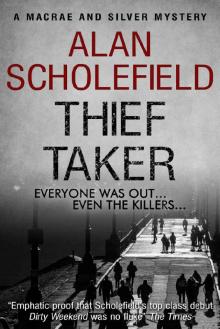 Thief Taker (A Macrae and Silver Mystery Book 3)
Thief Taker (A Macrae and Silver Mystery Book 3)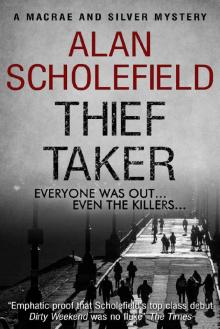 Thief Taker
Thief Taker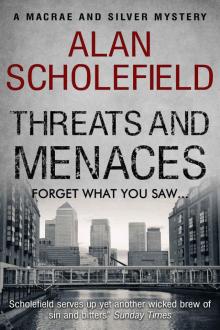 Threats and Menaces
Threats and Menaces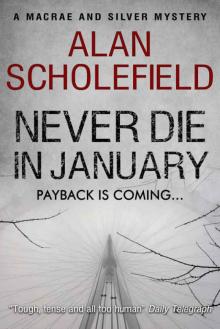 Never Die in January
Never Die in January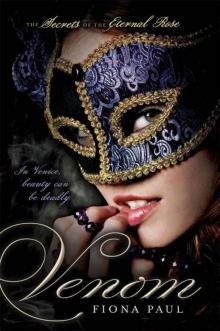 Venom
Venom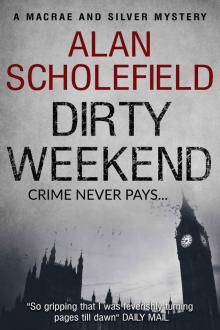 Dirty Weekend (Macrae and Silver Book 1)
Dirty Weekend (Macrae and Silver Book 1) Cat's Eyes
Cat's Eyes Berlin Blind
Berlin Blind The Sea Cave
The Sea Cave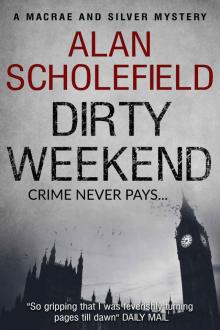 Dirty Weekend
Dirty Weekend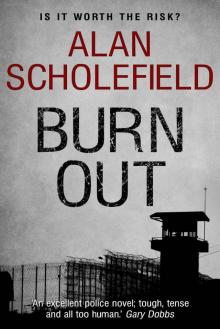 Burn Out (Dr. Anne Vernon Book 1)
Burn Out (Dr. Anne Vernon Book 1)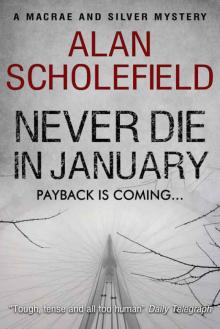 Never Die in January (A Macrae and Silver Mystery Book 2)
Never Die in January (A Macrae and Silver Mystery Book 2)